

Luttes antinucléaires. Resources for the Future - RFF.org. World Energy Report (Infographic) Clean Power Published on September 30th, 2011 | by Zachary Shahan "World Energy Report" (CLICK TO ENLARGE) OK, so this isn’t an official World Energy report just released by some international energy organization or research institute, but it is a fun infographic created by some friends of ours over at MyEnergy.com that helps to visualize and convey some key energy facts.
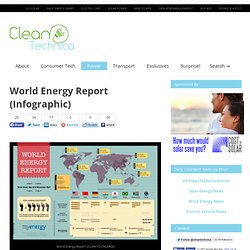
One of the most striking points (visualized with the Big Macs) is how much more energy per person the U.S. and other developed nations use compared to India, China, or the world as a whole. Here’s a good quote from the World Watch Institute on that (from State of the World 2008: Innovations for a Sustainable Economy): “Clearly, Western Nations have been the key driver of climate change so far. 7 Environmental Problems That Are Worse Than We Thought. With as much attention as the environment has been getting lately, you’d think that we’d be further along in our fight to preserve the world’s species, resources and the beautiful diversity of nature. Unfortunately, things aren’t nearly that rosy. In fact, many of the environmental problems that have received the most public attention are even worse than we thought – from destruction in the rain forest to melting glaciers in the Arctic. We’ve got a lot of work to do. 7. Paul Stamets on 6 ways mushrooms can save the world.
Home - Climate CoLab. Extreme Ice Survey. Climate and the Web: 'Electronic Democracy on Steroids' Global Warming, Climate Change, Ecosystems, Sustainable Markets, Good Governance & the Environment. Information and communication technologies for environmental sustainability. Information and Communication Technologies for Environmental Sustainability (ICT Ensure) is a general term referring to the application of Information and Communication Technologies (ICTs) within the field of environmental sustainability.
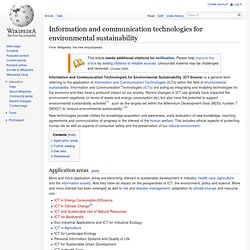
Information and Communication Technologies (ICTs) are acting as integrating and enabling technologies for the economy and they have a profound impact on our society. Recent changes in ICT use globally have impacted the environment negatively (in terms of waste and energy consumption etc) but also have the potential to support environmental sustainability activities[1] , such as the targets set within the Millennium Development Goal (MDG) number 7 (MDG7) to “ensure environmental sustainability”.[2] New technologies provide utilities for knowledge acquisition and awareness, early evaluation of new knowledge, reaching agreements and communication of progress in the interest of the human welfare.
Application areas[edit] Further reading[edit] NOÉ Biodiversité ~ protection et sauvegarde de la biodiversité.
Ecological footprint. Category:Waste. Welcome — DIVERSITAS. La fin programmée de la civilisation du gâchis. Réflection faite. De quoi est fait notre avenir? Quel avenir pour notre civilisation? Dates d'puisement des ressources naturelles de notre planète. Nous vivons depuis longtemps sur la Terre, une accueillante petite planète d'un système stellaire parmi des milliards de milliards d'autres.
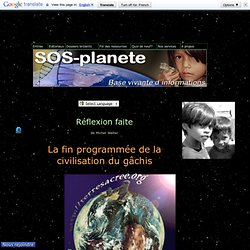
Dans un univers qui vient de rien (on parle de fluctuation du vide) et qui a explosé il y a 13,7 milliards d'années, d'après notre dernière datation. Nous en avons conscience et nous nous posons des questions essentielles. Qu'est-ce que la vie ? Est-elle extrêmement répandue dans notre galaxie et dans les cent milliards d'autres, répondant à des lois chimiques universelles ou bien est-ce un phénomène rarissime au point que la Terre soit finalement une exception dans l'univers, l'héritière d'une somme incalculable de hasards tous aussi improbables les uns que les autres ? Tout irait bien dans le meilleur des mondes possibles si nous ne faisions pas les terribles observations suivantes : L'espèce dominante, Homo sapiens, a vaincu toutes les étapes de l'adaptation à toutes sortes de milieux souvent hostiles.
Sauvons les abeilles - Terre d'Abeilles. Fleeing Vesuvius: The psychological roots of resource over-consumption. Here is my updated chapter from Fleeing Vesuvius The psychological roots of resource over-consumption Humans have an innate need for status and for novelty in their lives.
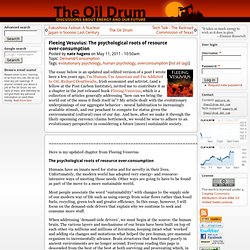
Unfortunately, the modern world has adopted very energy- and resource-intensive ways of meeting those needs. Other ways are going to have to be found as part of the move to a more sustainable world. Most people associate the word “sustainability” with changes to the supply side of our modern way of life such as using energy from solar flows rather than fossil fuels, recycling, green tech and greater efficiency. When addressing ‘demand-side drivers’, we must begin at the source: the human brain.
This essay outlines two fundamental ways in which the evolutionarily derived reward pathways of our brains are influencing our modern overconsumption. Status Evolution has honed and culled ‘what worked’ by combining the substrate of life with eons’ worth of iterations. Mating success is a key driver in the natural world. 350.org. MIT's artificial leaf is ten times more efficient than the real thing. Speaking at the National Meeting of the American Chemical Society in California, MIT professor Daniel Nocera claims to have created an artificial leaf, made from stable and inexpensive materials, which mimics nature's photosynthesis process.
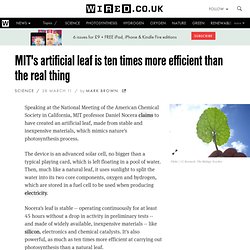
The device is an advanced solar cell, no bigger than a typical playing card, which is left floating in a pool of water. Then, much like a natural leaf, it uses sunlight to split the water into its two core components, oxygen and hydrogen, which are stored in a fuel cell to be used when producing electricity. Nocera's leaf is stable -- operating continuously for at least 45 hours without a drop in activity in preliminary tests -- and made of widely available, inexpensive materials -- like silicon, electronics and chemical catalysts. It's also powerful, as much as ten times more efficient at carrying out photosynthesis than a natural leaf.
Those are impressive claims, but they're also not just pie-in-the-sky, conceptual thoughts. Reliable Prosperity. List of environmental issues. Save The Arctic. Category:Environmental issues. Marine garbage patches. The Story of Stuff Project. Category:Pollution. Earth Paradigm.